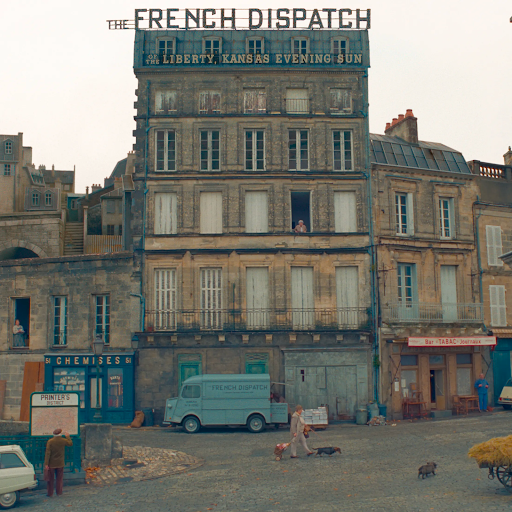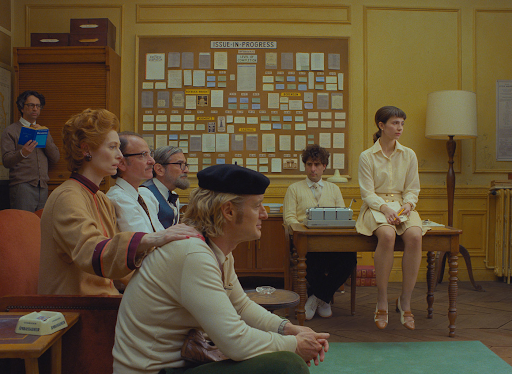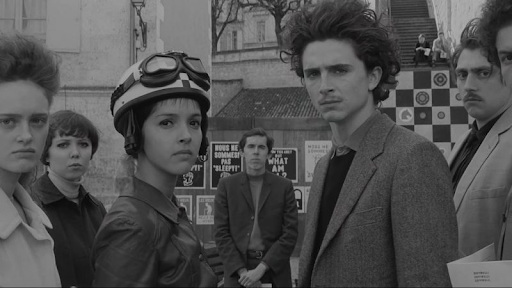The name ‘Ennui-sur-Blasé’ directly translates to ‘Boredom-on-Jaded’, and this phrase sums up the essence of The French Dispatch perfectly. Anderson’s style has gone well beyond that of self-parody, and it is clear that behind the meticulous aesthetics is nothing more than cynicism, and one could say, a vague boredom. But is Anderson to blame for this? On a closer, more sociological reading of the film, I would say no, not completely. Anderson as an artist and a director is, at least partially, unconscious of this, and can even be said to be attempting to counteract this. I intend to argue that The French Dispatch, and Anderson’s work as a whole, can be analyzed and understood as symptomatic of a bored and jaded culture, trapped in a deadlock of nostalgia and self-parody.
Cultural theorist Mark Fisher would say that this is only natural. According to Fisher, there is no question of art enacting genuine deviation anymore. The concept of art as an ideal that seeks earnestly to create new horizons is laughable now. Fisher pairs the commodification of art with this cynicism found in contemporary culture. Each story in The French Dispatch depicts characters who are artists and revolutionaries, yet through their self-mocking, blank style of delivery, the characters make fun of the things they stand for. Under the explicit content of the film, depicting artists and manifesto writers, is an implicit subtext of cynicism. This is one of the largest consequences of postmodern culture. And this is a major factor resulting both in a nostalgia culture, and in the nostalgia of Anderson's style. In a comment on Peter Sloterdijk’s book Critique of Cynical Reason, Slavoj Žižek says that “[today] ideology’s dominant mode of functioning is cynical. (...) The cynical [person] is quite aware of the distance between the ideological mask and the social reality, but he nonetheless still insists upon the mask.” One can see this insistence in The French Dispatch. On the surface is the mask of nostalgic celebration of all things vintage, creative, modernist; yet beneath this is nothing but mockery.
Using these insights, we can track the timeline of the emergence of nostalgia culture in Anderson’s work. According to Fisher, the artistic impotence created by these forces reached a new high in the 2000’s. By that time, it became conceptually impossible to create anything new, at least in the mainstream, and ultimately this is when nostalgia culture emerged. From ‘business ontology’ came artistic ‘hauntology’: a depressed nostalgia for new art forms, a nostalgia for a time that was not caught in a loop of recycled forms, endlessly commented on by the metalanguage of cynicism. Anderson's early films, made between the late ‘90’s and the early 2000’s, like Bottle Rocket, Rushmore, and The Royal Tenenbaums, still existed, at least conceptually, within the time period they were filmed. The development of Anderson’s acutely nostalgic aesthetic was already running counter to this in his early work, and by the 2010’s Anderson’s films began to lose all context of time altogether. Films like The Darjeeling Limited and Moonrise Kingdom bore the aesthetic of the 20th century, yet no one can say they are period films. They neither exist in the 20th century nor in the time they were created. Anderson’s films are packaged in the new-old, they give the viewer the fake experience of modernist artistic aesthetics, while their form remains within the harshest postmodern disposition. The characters of The French Dispatch, just as the characters of Anderson’s previous works, adorn a closet of perfectly coordinated outfits, pastel and perfect down to the hem. The set dazzles with its reminiscence, Ennui-sur-Blasé reminds one of the streets of Paris pictured in an early François Truffault film; but, unlike the earnestness seen in the eyes of Antoine as the camera follows him to the end of the beach at the climax of Truffault’s Les Quatre Cents Coups, Anderson’s characters speak in monotone voices, filled with mawkishness, and his sets are only the enhancement of recycled references. Anderson’s films are explicitly nostalgic, yet they do not repeat the true gesture of the past they imitate; every gesture, every line in the script, is but a simulation of itself, making fun of the very aesthetic referent its nostalgia is built on.
Analysis of the film raises a question as to how conscious Anderson is of these dynamics. From one angle it appears as though he is aware of the social and cultural dynamics at play in his own work, and one may venture to say that in The French Dispatch he chose to take the logic of nostalgia and cynicism to its endpoint in an attempt to critique this logic itself. This must be partially true, due to the very conscious choices made; was naming the setting for the film ‘Boredom-on-Jaded’ a mistake, or was it merely a sally of wit? Yet, whether or not Anderson is conscious of these dynamics does not redeem the film. I would predict that Anderson’s style has no place left to go but to reproduce a variation of the same blueprint pictured in The French Dispatch in his next film. It is not up to Anderson to break the postmodern logic inherent in nostalgia culture. For art and film in the wider sense, the only way to break from this deadlock is to be liberated from cynicism by emphasizing a new earnestness, non-referential to any imagined aesthetic of the past. The French Dispatch should be seen as the prime example of the existing order of cultural production that needs to be destroyed if there is any hope of taking art to a place of possible new creation.




 RSS Feed
RSS Feed
